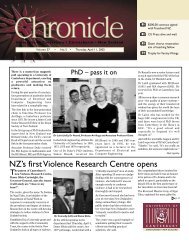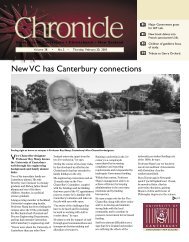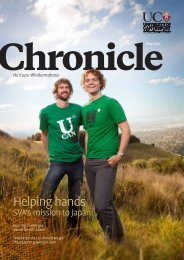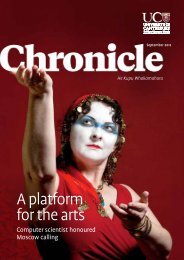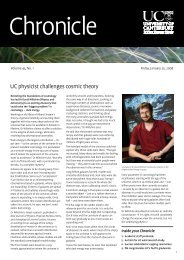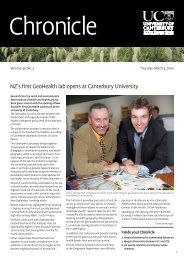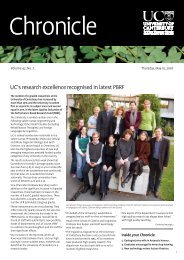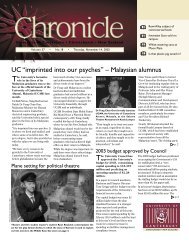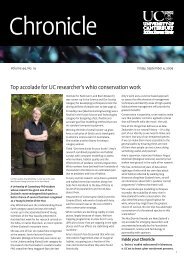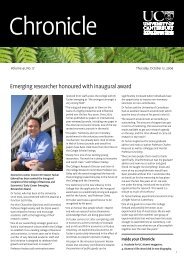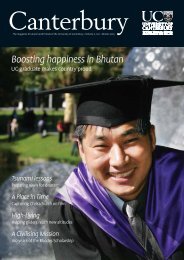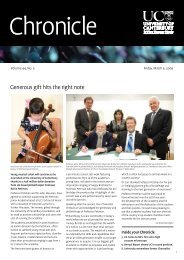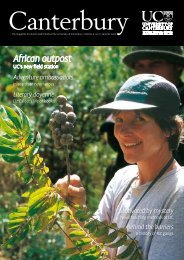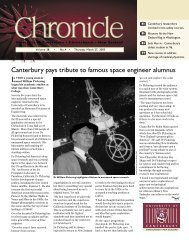Download - Communications and Development Department ...
Download - Communications and Development Department ...
Download - Communications and Development Department ...
Create successful ePaper yourself
Turn your PDF publications into a flip-book with our unique Google optimized e-Paper software.
Underst<strong>and</strong>ing the choices people makeBy Jeanette ColmanHow does society decide who should payfor public goods? Take, for example, astreet lamp in a cul-de-sac. The additionalsecurity <strong>and</strong> convenience is there for allthose living in the neighbourhood but howdo you get people to voluntarily contributeto its cost?Voluntary contributions may be gatheredfrom those people who are motivatedby appeals to their civic consciencewhile others may be shamed into it byinformal social pressures that withdrawstatus <strong>and</strong> respect from people identified<strong>and</strong> stigmatized as being free riders.Monetary sanctions are another optionbut are typically costly to implementthereby reducing their efficiency whenimplemented alone.Grappling with these issues is Universityof Canterbury senior economics lecturerDr Steven Tucker. As an experimentaleconomist Tucker uses controlled,scientifically-designed experiments totest economic theories under laboratoryconditions <strong>and</strong> assess the effect ofincentives on people’s decision-making.He runs “games” both in the lab <strong>and</strong> in thefield to test behaviour patterns to betterunderst<strong>and</strong> why people make the choicesthey do <strong>and</strong> to test the efficiency of variousmechanisms against one another given thedecisions made by individuals.“I’m fascinated with the choices peoplemake. Why is it that in the middle ofnowhere with no cars for miles aroundpeople will still stop at a red light? Mostpeople won’t litter downtown becauseof sanctions yet if they were on top of amountain all by themselves they probablywouldn’t litter either.“Social norms exist even when theopportunity for punishment is notavailable. Yet some people are not affectedthis way <strong>and</strong> can deliberately avoidsanctions others try to impose.”Tucker’s research has led him to beingnamed the inaugural recipient of theCollege of Business <strong>and</strong> Economics’ EarlyCareer Emerging Researcher Award.Pro-Vice-Chancellor (Business <strong>and</strong>Economics) Professor Nigel Healey saysTucker stood out among a strong fieldof nominations on the basis of a highlyproductive past four years.Since arriving at the University in 2002,Tucker has published six papers ininternational peer-reviewed journals,including one paper in the AmericanEconomic Review, one of the top rankedeconomic journals in the world.Dr Steven Tucker has been named the inaugural recipient of the College of Business <strong>and</strong> Economics’ Early Career EmergingResearcher Award.His paper, “Monetary <strong>and</strong> non-monetarypunishment in the voluntary contributionsmechanism”, has already been cited 20times in Web of Science journals <strong>and</strong> overallhis papers have been cited more than 100times in the Google Scholar listings.Healey sees Tucker as one of the University’srising stars. “Clearly he is one of our excitingyoung researchers. The work he is doing isinnovative <strong>and</strong> world-class.”Tucker says it is a great honour to berecognised by his peers.“It is an honour that people whom I respect<strong>and</strong> who are research active themselvesacknowledge that I am doing good work.”Tucker came to UC after completing a BAin economics at the University of Colorado<strong>and</strong> an MS <strong>and</strong> PhD in economics at PurdueUniversity.“I was fortunate to work with ProfessorCharles Noussair at Purdue. It was amazingto see first-h<strong>and</strong> the effect of incentiveson behaviour so I caught the fire forexperimental economics.”His paper in the American Economic Reviewshows that voluntary contributions towardsthe provision of public goods can besignificantly increased when individualshave the opportunity to impose nonmonetarysanctions on non-contributors.Tucker says UC has an excellent researchenvironment which is the envy of many ofhis peers in the US.“The research environment at Canterburyis outst<strong>and</strong>ing. The amount of support youget in terms of mentoring, the resourcesthat are made available to get yourresearch agenda on the way <strong>and</strong> the timeallowed to carry out research is top-notch.”Tucker believes experimental economicshas a bright future at Canterbury.“One of my goals is to move this Collegeforward <strong>and</strong> possibly be known as anexperimental hub of Australasia. We arewell under way with the excellent coregroup of experimentalists that we havebeen fortunate enough to assemble hereat Canterbury. I am very excited to seewhat we can all accomplish together overthe next few years.”22 Canterbury Magazine



